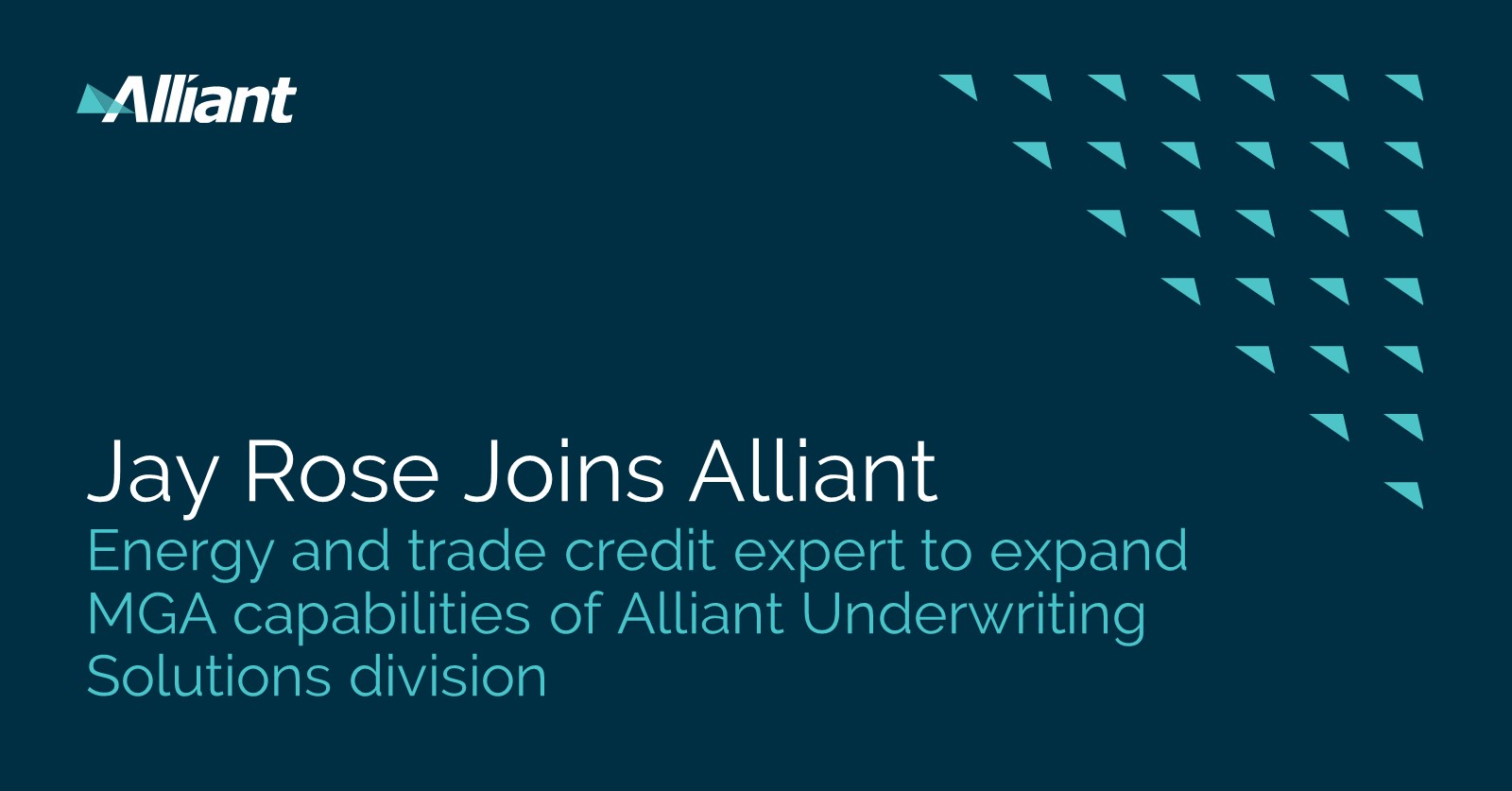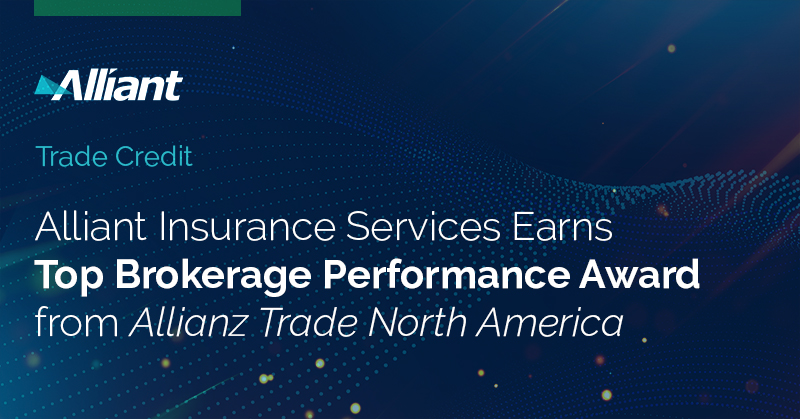Specialty Podcast: Trade Credit Insurance in a Global Recession
By Alliant Specialty
Ryan Babeu, Alliant Trade Credit speaks with Christina Montes de Oca, CCO, Allianz, to discuss the current state of the economy and evaluate the potential risks of a global recession. Christina reviews lessons learned during the pandemic and what precautions should be put in place to best manage risk.
Intro (00:00):
You're listening to the Alliant Specialty Podcast, dedicated to insurance and risk management solutions and trends shaping the market today.
Ryan Babeu (00:09):
Welcome to Alliant Trade Credit Podcasts. I'm your host, Ryan Babeu, Vice President of Alliant Trade Credit. I'm here to discuss all things related to trade credit and risk management. I have with me today Christina Montes de Oca. She is the Chief Commercial Officer over at Allianz. Hi Christina, how are you?
Christina Montes de Oca (00:29):
I'm good, and you?
Ryan Babeu (00:31):
I'm doing good. Happy Monday to you.
Christina Montes de Oca (00:33):
Thank you very much. I'm glad to be here on this Monday morning.
Ryan Babeu (00:36):
You know, now that we've got you here, I wanted to ask about some of the things that are taking place in the economy, and certainly, there are some pretty significant changes happening, whether some people say we are already in a recession or approaching a recession. I wanted to get an understanding of how Allianz views what's going on right now. How are you guys dealing with your trade credit risk perspective, evaluating the potential things that could come up with a recession, with exposures, with claims, and how the market's transitioning?
Christina Montes de Oca (01:15):
Yeah, that's a very good question. So, maybe to put it in perspective, and it's hard to talk about where we go without talking about what's been going on for the last couple of years. I've personally been here 17 years, so I have been through what I consider the great financial crisis back in '08, '09, and the impacts on the business. And of course, we got into covid, and we didn't have a global pandemic playbook. And so having to understand how to manage through that was kind of a day-to-day event. And relying on the feedback from our relationships, our policyholders, our customers, about what was happening in the market was very critical. And I think because of that, there were great lessons learned about how we come together when, you know, balance sheets and income statements can't tell you the whole story, especially with what we just went through.
Christina Montes de Oca (02:07):
And I think that we're still seeing a lot of those impacts in the market as now we start to go into a potential recession. One of the things I think we've learned is taking a broad-stroke approach to what's about to happen isn't going to work. It's not going to work for us, and it's not going to work for our policyholders. So, where we're focusing as we go forward are potentially pockets of concern, right? So, if we are in a recession, are there specific industries that are weaker because of inflationary pressures? Are we going to spend less at Christmas, is retail in trouble, is an example of where we may look more deeply? We may look at highly leveraged companies that may face some impacts as we go into this continued inflationary environment. So rather than taking a broad-brush approach, we're trying to look at where we may have pockets of concern interacting with our customers and our clients to get their feedback about what's happening in the business.
Christina Montes de Oca (03:06):
I think for us, the biggest lessons learned in the last couple of years are stories matter, feedback matters, the day-to-day interactions with the customers matter. So as smart as we can be, we can hire the best financial analysts in the world - that doesn't replace the stories. And so that's what we're trying to increase as we go forward. We're looking to expand the size of some of our risk team in order to have more of those conversations as we're looking at the impacts of all of the things going on in the world, on the business, and on the impacts to our customers.
Ryan Babeu (03:39):
Right. That's a good point. And specific to industries, I mean, you see such a variance in terms of how they've been affected. You see some commodities in food. They've actually grown stronger through the pandemic, but they're still having issues as it relates to their supply chain and how does that impact the market? And certainly, as we look at the supply chain, we look at how inflations created more pressure not only on the pricing, but the coverage limits associated with how people are choosing to ensure their receivables, the amount of exposure that the carriers are taking on. You know, it's kind of a double-edged sword in which, you know, we are in a type of recession and even dealing with covid where you want to be cautious and understand what's going on, but you've got to meet the demands of a lot of the relationships as prices are going up, the exposures go up and coverage has to coincide with that. So how is your underwriting side dealing with the risk evaluation and the demand for increased coverage during times in which we have to be careful about what's happening within the economy?
Christina Montes de Oca (04:58):
Yeah, the increased coverage pressures are there. We see it as we track kind of the volume commitments as we renew, and it's up actually at a higher pace than even what we're seeing in inflation. And then there's this behavior that more volume always equals less price, right? In our world, more volume means more concentrated risk, right? I'm not getting more volume because our relationships are spreading out and picking up all these new clients, right? They're just getting this more concentrated risk in the clients that they already have, which doesn't necessarily need to translate into discounting, but you have all of that, right? We're trying to manage affordability, keeping programs in place, concentrated risk, and it's not an easy task to manage those expectations. And so, it's getting everybody to understand that there is potential support there, but there is a right price for risk and reward and concentrated risk as well.
And I think that's probably been one of the most difficult tasks to manage is those expectations to the market, you know, around what is the right appetite, what is the right price? We are the largest carrier in the world, and I have the most capacity on most buyers than anybody else in the world. And that challenge of when is enough? what's another 5 million? What's another 10 million? Where do you draw the line when you're looking at billions of dollars of coverage on certain names? Like when's enough, enough? And that's always a balance. And then, of course, adjusting your reinsurance strategy behind that, right? In order to support that. So, all of those things have gone on a definite hard look at the reinsurance strategy this year so that we can continue to support our clients as well as drive our future plans in the market as well. And so, we have to kind of pull all of those things together, which isn't easy to do, right?
Ryan Babeu (06:52):
And certainly, adjusting the underwriting position to satisfy the needs of the marketplace. And you know, I'm seeing in our end people being a little bit, companies being a little bit more receptive to sharing financial information where they hadn't in the past because of the pressures. And they understand it goes both ways between their suppliers and vendors as well as, you know, their buying ability. So, you know, using different information and predictive analysis, I'm sure certainly goes into looking at how you can evaluate things if as the market changes and are people sharing information. So, that all plays an important part in how you guys evaluate that risk. So, with the name change, you guys have moved on from previously being Euler Hermes to Allianz. Where did that take place? What decision went into that to adopting your parent name and how do you see that that's going to play a positive impact for you and the clients alike?
Christina Montes de Oca (07:56):
Yeah, so I feel like it's been coming for the whole 17 years I've been here. It's just taken 17 years for us to finally, pull the trigger. Rebranding has allowed us to take on the namesake of one of the top 34 brands in the world. So that's huge. That name is more well-known globally than Euler Hermes was. So, it really is a big deal. We're only just starting to see the impacts in our marketing efforts as we've started to do that after the name change, we are sponsoring the Olympics & Paralympics through the 2028 Los Angeles. So, if you just think around about the type of brand recognition that gives us, and ultimately, you know, we want to be one of the top brands in the world, that's Allianz's ambition. And to do that requires getting kind of the rest of the entities on board and then driving together, committed together forward to getting that brand out in the market. And we're excited as time goes on to see what that impact is in our marketing efforts.
Ryan Babeu (09:00):
Yeah, well, you know, that's great and we're excited about it too. And in our relationship with Allianz has been great over the years and, you know, you have our full support and we're excited for what the future brings. And certainly, as we move into the future, you know, what are some of your ambitions and future growth expectations as we advance here toward the end of 2022?
Christina Montes de Oca (09:25):
Yep. Thank you for that question. And I think the rebranding is the first step in that if we look at the US there's huge potential for growth in trade credit. We have far more mature markets overseas and we've been continuing to try to kind of crack that nut in the United States. So, step one with the rebranding gives us that name. We're heavily investing in our marketing and distribution efforts at record levels, really over the next four or five years to see if we can expand the use of our product in the market. We're coming off of, you know, record retention rates, which is positive, just reinforcing the value in our product, even though the claims environment has been relatively benign. And so that's, that's all-positive trending, that we're doing the right things when it comes to servicing and value proposition, etc. Now it's time to accelerate that as we go forward. And we're committed to that even through a recession and how we stay in it with our clients and accelerate through that because we think we'll be a critical component to helping our policyholders’ customers and new prospects in the future get through some tough times. And what we are potentially about to go through is going to be a real testament to that.
Ryan Babeu (10:39):
Right. Yeah, no doubt about it. Well, I'm excited to see what the future brings. I appreciate you coming on the podcast with us. You know, hopefully, we'll connect soon. Thank you very much for your time.
Alliant note and disclaimer: This document is designed to provide general information and guidance. Please note that prior to implementation your legal counsel should review all details or policy information. Alliant Insurance Services does not provide legal advice or legal opinions. If a legal opinion is needed, please seek the services of your own legal advisor or ask Alliant Insurance Services for a referral. This document is provided on an “as is” basis without any warranty of any kind. Alliant Insurance Services disclaims any liability for any loss or damage from reliance on this document.
Thanks for your message.
We’ll be in touch shortly
News & Resources




